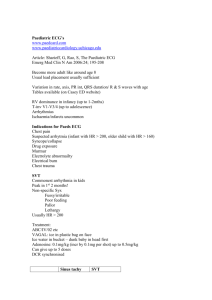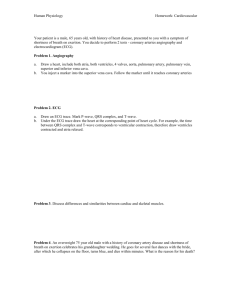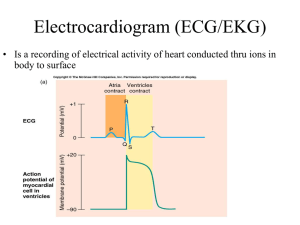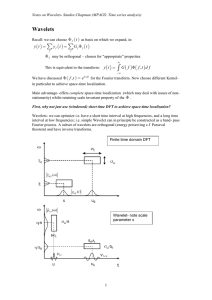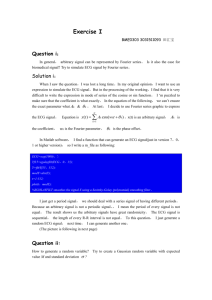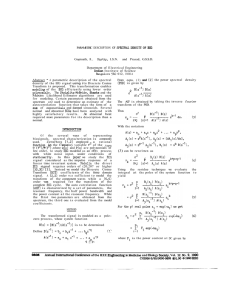Week 2 Lecture 1
advertisement
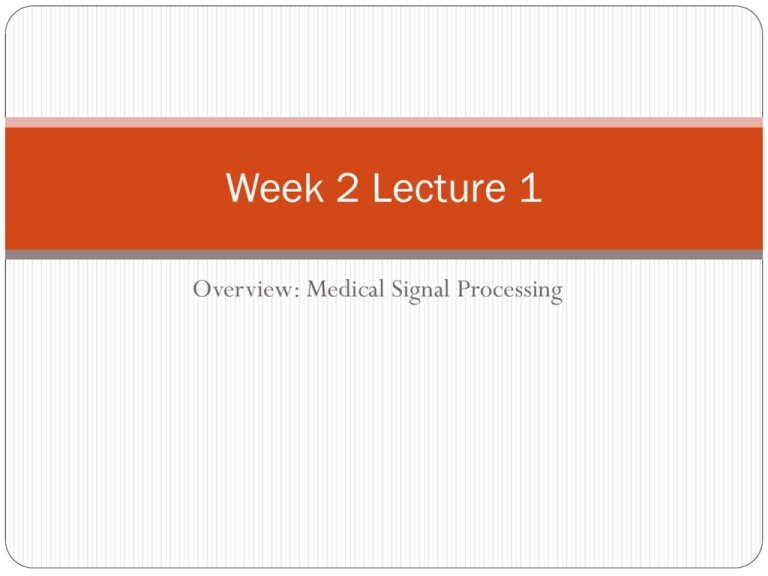
Week 2 Lecture 1 Overview: Medical Signal Processing Why Medical Signal Processing? Purposes: - Raw medical signals: Difficult to diagnosis - After transform, easier to find features - In many times, we need to use Machine Learning to further find “patient symptoms” from those features. This is called “Signal Learning”. - Sometimes we compress signals to save storage overhead. - Many times we need to remove noise from signals. - Use filters to remove high or low frequency components. - Many other signal processing purposes … Example: ECG signal analysis How do we know a patient has heart disease? Note: a cardiac doctor is not present – Thus we can only use computer to automatically recognize heart disease Today people use ECG sensor to collect heart beat signals Given an ECG sensor signal, how do we know if it is normal or not? From a textbook on cardiology Clinically Relevant Parameters • QRS duration Bundle brand block depolarization • ST segment ischemia • QT interval ventricular fibrillation • PR interval SA ventricles Rhythm example • • • • • Rate? Regularity? P waves? PR interval? QRS duration? 70 bpm occasionally irreg. 2/7 different contour 0.14 s (except 2/7) 0.08 s Interpretation? NSR with Premature Atrial Contractions Classification of ECG signals E. Classification ① Linear discriminate analysis (LDA) ② Quadratic discriminate analysis (QDA) ③ K nearest neighbor (KNN) rule We can use the Euclidean metric to measure “closeness” in the KNN classification model Denoising Long-Term ECG Evolution Application: Electrocardiogram baseline wandering reduction Magne to ‘en ‘ce pha lo ‘graphy (MEG, googled images) Multimodal Imaging • • Combining MEG data with FMRI results in a hybrid image which has both good temporal and spatial resolution. 11 Focal Generalized Multi-local Spike + Wave complex 12 13 14 Tool example: Fourier Analysis Breaks down a signal into constituent sinusoids of different frequencies In other words: Transform the view of the signal from time-base to frequency-base. Can we improve Fourier tool? By using Fourier Transform , we loose the time information : WHEN did a particular event take place ? FT can not locate drift, trends, abrupt changes, beginning and ends of events, etc. Short Time Fourier Analysis In order to analyze small section of a signal, Denis Gabor (1946), developed a technique, based on the FT and using windowing : STFT What is Wavelet Analysis ? And…what is a wavelet…? A wavelet is a waveform of effectively limited duration that has an average value of zero. 19 Use Wavelet to analyze brain images 20 Machine Learning – A promising signal analysis tool Types of Problems Solved using ML 1. Classification (class labels) – OCR, Handwritten digit recognition 2. Regression (continuous values) – Ranking web pages using human or click data 3. Clustering - No-label data classification 4. Modeling - Inferring a Probability – seek probability distribution parameters Classification example Regression problem Clustering problem Example Successful Application of Machine Learning The ML Approach

